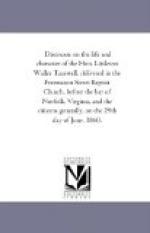He lived to behold a very different state of things. He lived to see it one of the cleanest cities in the world, and to see more miles of paved streets in Norfolk than any other city south of the Potomac can boast of; and those streets lighted up every night with a brilliancy equal to that which a rejoicing people, thirteen years later than 1802, kindled in commemoration of the victory of New Orleans, and of the peace with Great Britain. He lived to see the Negro population as well clad, and the female part of it as fully crinolined, as the great body of the respectable white people of 1802, and worshipping every Sabbath in churches of their own, better and more costly than the best church of that day; while the white people have added, and are adding every day, church to church and chapel to chapel, some of which are even elegant in their architecture, and all comfortable in their arrangements beyond the conceptions of that day. He lived to see, instead of three men worth one hundred thousand each, three men, one of whom he was, whose united wealth would reach a million, besides many others with one hundred thousand down to ten thousand. He lived to see the population increased from seven thousand to seventeen thousand; and, to say the least, fully as well clad, as well fed, as their fathers ever were, and living in better houses than their fathers ever lived in. He lived to see our banking capital, whether invested in public banks, in savings institutions, and in the hands of private bankers, swell above the fragmentary portion which the old Bank of the United States could afford to allot to us, to somewhat over two millions of dollars, almost wholly owned by our own people; and to read our monthly bills of mortality, which attest, beyond the reach of cavil, a condition of general health without a parallel in the annals of cities laved by the tides. He lived to see the farmers, who supplied the population of 1802 with vegetables and fish enough to serve, but none to spare, ship off nearly half a million’s worth to the north every season; and to see land in the neighborhood, which in 1802 was worth hardly anything more than what the doctor reaped from its crop of agues, become salubrious, and sell for fifty dollars an acre. He lived to see our city connected with the West, the South, and the North, by steamships whose tonnage would in those days have been pronounced fabulous, by railways, and by the magnetic telegraph. He lived to see a larger tonnage arriving and departing annually from




